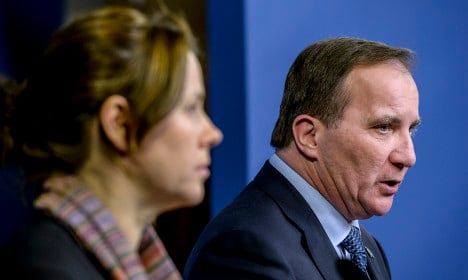'Swedes can still hold their heads high'

Sweden's decision to cut the number of refugees it accepts doesn't mean the country has shed its humanitarian superpower identity – merely that it could no longer do it all on its own, writes The Local's correspondent Paul Connolly.
Many of Sweden’s critics are crowing today after the centre-left coalition government on Tuesday afternoon announced a shock tightening of asylum rules in a bid to stem the influx of refugees.
The narrative being hawked around by those who loathe Sweden’s position as one of the world’s most socially progressive nations is that Sweden has finally come to its senses, that Sweden has finally declared, “We hate refugees too!”
Anyone who watched the Social Democrat prime minister, Stefan Löfven, and his Green party deputy, Åsa Romson, deliver the new, much tighter, measures last night, would scoff at such nonsense.
Löfven was speaking through almost-gritted teeth, such was his anger at his fellow EU leaders (German chancellor Angela Merkel aside, perhaps) and their resistance to taking any kind of responsibility for the refugee crisis.
Romson, meanwhile, was tearful.
Her Green party has long been the most refugee-friendly party in the Swedish parliament – the Riksdag – and her part in the clampdown on the numbers of refugees being allowed entry clearly stung her sharply.
These were not the attitudes of politicians who have undergone an ideological transformation.
Rather, they clearly restated their commitment to humanitarian values and emphasised how upset they were that they could no longer fulfil their earlier promises to those fleeing violence in the Middle East and Africa.

Deputy prime minister, Åsa Romson and prime minister, Stefan Löfven announcing the measures on Tuesday night. Photo: Janerik Henriksson / TT
Sweden’s U-turn was brought about not by a dramatic shift in worldview but because of practical matters.
Quite simply, Sweden could no longer cope with being one of the only two countries in Europe prepared to take responsibility in the midst of a global humanitarian crisis.
Newspapers this morning reported that a UN ambassador (who asked to remain anonymous) had remarked, “The last bastion of humanitarianism has fallen”.
This is, of course, abject piffle. Sweden, along with Norway, is still at the forefront of the type of international development aid aimed not at governments but at civil society.
This is the sort of aid that promotes liberalism and changes and saves lives.
There are proposals for some of this aid to be cut to help fund the surge of refugees but Sweden would still be at the vanguard of those countries devoting funds to those working on democracy-building and human rights.
However, it is quite clear that the government’s apparatus for dealing with the current influx of refugees (190,000 are expected this year) is close to collapse.
There is no emergency accommodation left and the welfare system is groaning. It’s obvious Sweden can do no more.
But this does not signify Sweden's fall from grace as a humanitarian superpower.
Swedish heads can still be held high and proud in the international community.
No, this U-turn is purely attributable to a shameful lack of compassion and courage from the rest of Europe.
Sweden’s critics may be gloating now but history will not look kindly upon their cowardice.
Comments
See Also
Many of Sweden’s critics are crowing today after the centre-left coalition government on Tuesday afternoon announced a shock tightening of asylum rules in a bid to stem the influx of refugees.
The narrative being hawked around by those who loathe Sweden’s position as one of the world’s most socially progressive nations is that Sweden has finally come to its senses, that Sweden has finally declared, “We hate refugees too!”
Anyone who watched the Social Democrat prime minister, Stefan Löfven, and his Green party deputy, Åsa Romson, deliver the new, much tighter, measures last night, would scoff at such nonsense.
Löfven was speaking through almost-gritted teeth, such was his anger at his fellow EU leaders (German chancellor Angela Merkel aside, perhaps) and their resistance to taking any kind of responsibility for the refugee crisis.
Romson, meanwhile, was tearful.
Her Green party has long been the most refugee-friendly party in the Swedish parliament – the Riksdag – and her part in the clampdown on the numbers of refugees being allowed entry clearly stung her sharply.
These were not the attitudes of politicians who have undergone an ideological transformation.
Rather, they clearly restated their commitment to humanitarian values and emphasised how upset they were that they could no longer fulfil their earlier promises to those fleeing violence in the Middle East and Africa.

Deputy prime minister, Åsa Romson and prime minister, Stefan Löfven announcing the measures on Tuesday night. Photo: Janerik Henriksson / TT
Sweden’s U-turn was brought about not by a dramatic shift in worldview but because of practical matters.
Quite simply, Sweden could no longer cope with being one of the only two countries in Europe prepared to take responsibility in the midst of a global humanitarian crisis.
Newspapers this morning reported that a UN ambassador (who asked to remain anonymous) had remarked, “The last bastion of humanitarianism has fallen”.
This is, of course, abject piffle. Sweden, along with Norway, is still at the forefront of the type of international development aid aimed not at governments but at civil society.
This is the sort of aid that promotes liberalism and changes and saves lives.
There are proposals for some of this aid to be cut to help fund the surge of refugees but Sweden would still be at the vanguard of those countries devoting funds to those working on democracy-building and human rights.
However, it is quite clear that the government’s apparatus for dealing with the current influx of refugees (190,000 are expected this year) is close to collapse.
There is no emergency accommodation left and the welfare system is groaning. It’s obvious Sweden can do no more.
But this does not signify Sweden's fall from grace as a humanitarian superpower.
Swedish heads can still be held high and proud in the international community.
No, this U-turn is purely attributable to a shameful lack of compassion and courage from the rest of Europe.
Sweden’s critics may be gloating now but history will not look kindly upon their cowardice.
Join the conversation in our comments section below. Share your own views and experience and if you have a question or suggestion for our journalists then email us at [email protected].
Please keep comments civil, constructive and on topic – and make sure to read our terms of use before getting involved.
Please log in here to leave a comment.